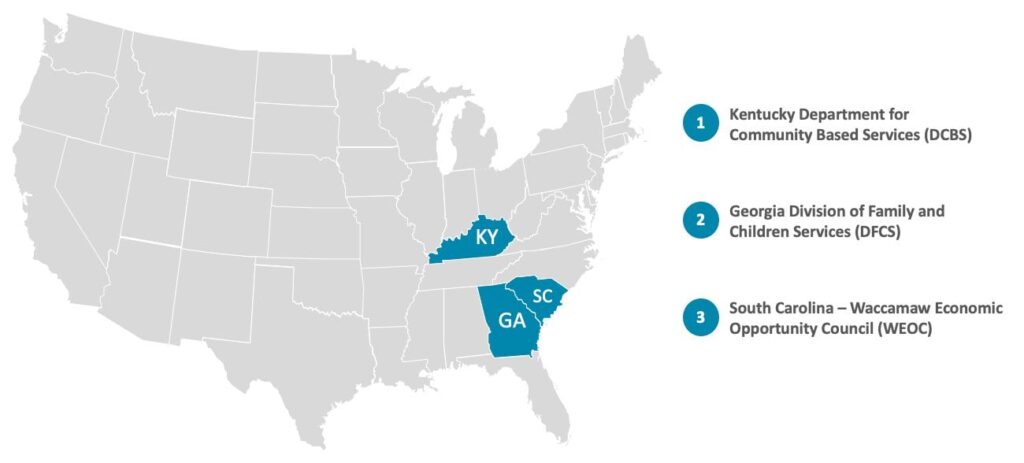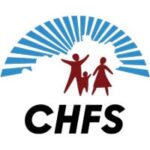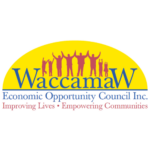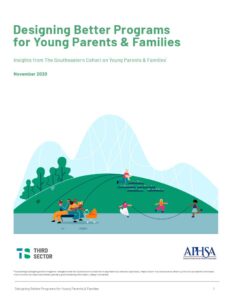The Southeastern Cohort on Young Parents and Families comprises three state and provider agencies that are working to enhance and align programs, policies, and systems to better support young parents (ages 16-24) and their families in Georgia, Kentucky, and South Carolina. Cohort members are benefiting from outcomes-oriented technical assistance (TA), peer-to-peer learning opportunities, and project support from Third Sector with the goal of identifying strategies to:
- Increase alignment and coordination between programs and public funding streams (including TANF, WIOA, SNAP, and Head Start)
- Develop new models for collaboration and co-creation within and between government agencies, nonprofit partners, and young parent families
These strategies are aimed at enhancing and strengthening the continuum of services young parents and their families have access to and driving better education, economic, and family stability outcomes using a two-generation approach.
Phase I of the cohort will run from January-June 2020 and is focused on planning and project design. Site-specific TA in this Phase will culminate in the development of an Outcomes-Oriented Implementation Plan for each site documenting strategies, resources, and implementation timelines for implementing changes to better support young parents and their families. Phase I is supported by a private philanthropic grant as well as funding from The Annie E. Casey Foundation.
Read more about the cohort sites and the project’s background below.
Southeastern Cohort on Young Parents and Families Sites


Georgia
Division of Family and Children Services
As our first engagement in Georgia, Third Sector is working with the Department of Human Services (DHS) and Division of Family and Children Services (DFCS) to align services to better serve young parents and families. DHS administers SNAP, Medicaid, and TANF to support families to meet their basic needs. To improve young family stability, DFCS aims to capitalize on cross-agency collaboration to develop a pilot that enhances supportive services for young parents aging out of foster care (ages 17-21 who are expecting or parenting) who have decided not to participate in the state’s Extended Youth Support Services (EYSS) program, and need to transition to alternative resources and support.

Kentucky
Department for Community Based Services
Deepening our work in Kentucky, Third Sector is engaging with Kentucky’s Department for Community Based Services (DCBS), Division of Family Support (DFS) within the Cabinet for Health and Family Services to improve DFS’ TANF-funded Kentucky Works Program (KWP). DFS administers critical resources to thousands of Kentuckians who face barriers to attaining and maintaining living wages. To address the specific barriers young parents face in the Kentucky Works Program (with a particular focus on justice-involved young parents, aged 18-24) DFS will be working with Third Sector to identify clear outcome goals for KWP’s young families and to provide more coordinated and enhanced wraparound services to support outcomes achievement over one, two, and four year timelines.

South Carolina
Waccamaw Economic Opportunity Council
As our first engagement in South Carolina, Third Sector is working with the Waccamaw Economic Opportunity Council (WEOC), a Community Action Agency which provides a suite of services to individuals and families across Horry, Georgetown, and Williamsburg counties. With technical assistance from Third Sector, WEOC is seeking to design (and subsequently implement) an innovative outcomes-oriented pilot program, which would provide case management and improved support tailored to the unique needs of young parents (ages 16-24) and their families (with a specific focus on those that are foster care attached). The goal is to develop a proof-of-concept of a scalable program model to improve education and employment outcomes for young parents and stability and self-sufficiency for their families.
Background
The need for this work and the focus on the Southeast stems from the fact that there are over 5 million young parents in the US parenting 3.4 million children, and many states in the Southeast rank among the highest in the country in terms of the size of their young parent population (Census Bureau - Population Survey, 2015–2017).
The odds are stacked against young parents as they strive to learn, earn, and raise a family. Most public programs, policies, and systems are not designed with the unique needs of young parents and their families in mind and, therefore, fail to provide the customized and integrated support needed to help them reach their goals. Third Sector is well-positioned to support states in addressing these challenges. This work builds on our workforce, health, and parent-centered projects; to date, we have led over 60 communities across the country to realign over $800M in resources towards achieving positive outcomes for individuals and families.
Designing Better Programs for Young Parents & Families: Insights from The Southeastern Cohort on Young Parents & Families
November 2020
This report highlights lessons learned from the Southeastern Cohort on Young Parents and Families (January to September 2020): an initiative aimed at enhancing and aligning programs, policies, and systems to better support young parents (ages 16-24) and their families in Georgia, Kentucky, and South Carolina. Lessons are shared across four domains: understanding and engaging young parents, continuous improvement through data and feedback, collaborating and aligning services, and providing services during COVID-19. These insights can guide government agencies, service providers, or others interested in better understanding and supporting young families through tailored programs aimed at improved outcomes.
Third Sector's Cohort Experience
Third Sector uses a cohort model to connect organizations and institutions working toward similar goals. To date, Third Sector has facilitated many cohort-based technical assistance experiences across several issue areas and jurisdictions. Third Sector’s cohorts combinesite-based technical assistance with in-person convenings and webinars to share content and encourage peer learning. Convening content may include panel discussions with leaders in the field, workshops with project teams, and working sessions with sites that allow for shared learnings and troubleshooting common challenges. We believe that the cohort model motivates and supports leaders, helping them break out of the “status quo” of their own jurisdictions, and enabling them to jointly identify creative ways to improve local outcomes.
Visit our Better Careers Design Group, California Full Service Partnership Outcomes-Driven Learning Community, PFS in Higher Education, Empowering Families, and Administrative Data Pilot pages to find out more about our current and past cohort work.
Resources
- Project Announcement
- Webinar: Strategies to Promote 2-Generation Outcomes
- Webinar: Strategies to Address the Benefits Cliff
- Webinar: Improving Transition Strategies for Young Parents Aging Out of Foster Care - Spotlight on Georgia
- Webinar: Improving Economic Stability for Young Parents – Spotlight on Kentucky & Massachusetts
- Webinar: Insights for Community Action Agencies: Designing Better Programs to Support Young Parent Families
- Blog Post: Insights for Designing Outcomes-Oriented Programs for Young Parent Families
- Pilot Launch: GA Division of Family & Children Services - Young Parent Pilot in Metro Atlanta


